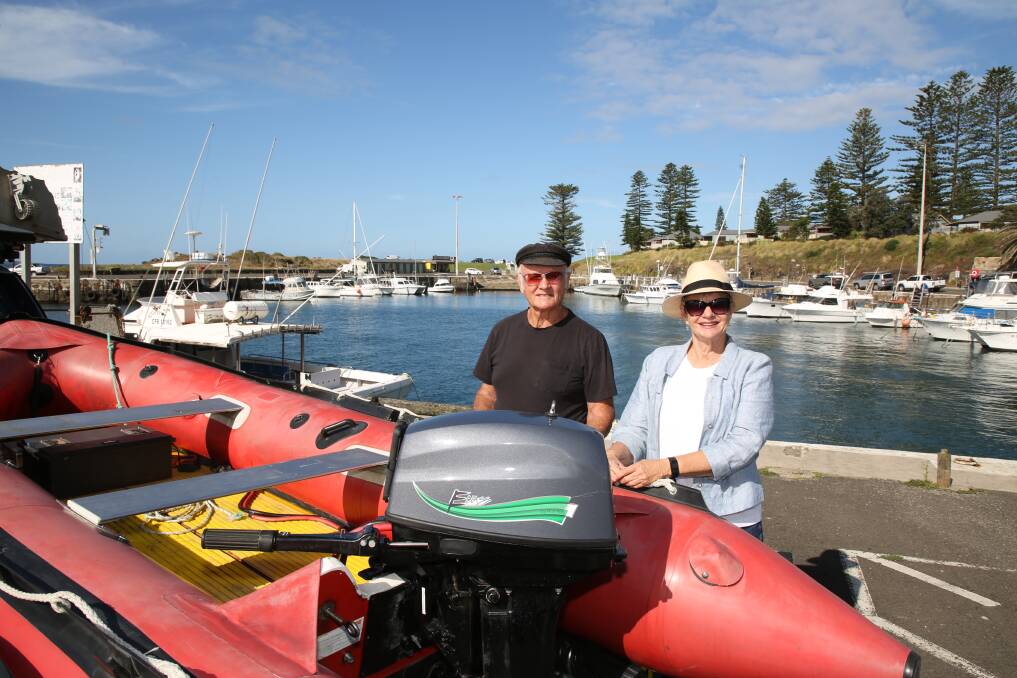
It is not only the possibility of electric and hydrogen cars being made in the region fueling interest in green transport at the moment.
Subscribe now for unlimited access.
or signup to continue reading
Environmentally friendly electric outboard motors are already being made in Kiama.
They are attracting the attention of fishers and boaters up and down the east coast.
It follows a collaboration between businesswoman Lynelle Johnson and automotive engineer Ron Kelly.
Ms Johnson founded E Class Outboards to ensure our pristine waterways can stay that way.
"After 10 years in development we have launched a range of powerful, portable electric outboards made in Kiama. Although electric trolling (low power) pod motors have gained wide acceptance. Ours are a world first for a true affordable replacement of polluting 2 Stroke and 4 Stoke outboards up to 15 horsepower."
Ms Johnson said while new 2 Stoke outboard motors are now banned from being sold, there are still many in our waterways.
Many people who find out about the new electric motors are interested in having their present motor converted by Mr Kelly.
Ms Johnson said there is a huge market for outboards in an industry worth around $17 billion a year.
"E Class Outboards signals the start of a new Australian industry," she said.
Ms Johnson said it took a while to develop the business because it had been tricky to make electric outboards affordable.
"There is some amazing work being done in Europe on electric ferries and big boats. But we wanted to concentrate on replacing those two strokes that are polluting our waterways," she said.
"They are your 5hp to 15hp motors. Pod motors have had great acceptance. The fisherman love them because all electric motors have instant torque which means you can go so slow you can watch the propeller turn.
Ms Johnson said Mr Kelly, 76, had used his considerable know-how to crack the performance and run time requirements of most recreational fishers.
"He has been a boat builder for 50 years. He was the largest builder of surf life saving boats in the world at once stage. He has done surf-skis, he has done two Sydney to Hobart yacht races in his own yacht and he has raced and built speed boats. That combination of experience with mechanics and boats has allowed him to put together something that actually works in real life conditions."
Ms Johnson has a background in marketing and knew what Mr Kelly was working on as essentially a hobby in retirement. She was looking for a new business opportunity and saw he had reached the point where the production of electric outboards could be commercialised.
Mr Kelly was happy to collaborate and most of the business to date has been customers wanting to use existing outboard motor casings and fitting them with an electric motor.
"We want to get as many two strokes converted as we can," Ms Johnson said.
"It is the way he fits the electric motors and programs them that works so well. And we have had our own lithium iron batteries commissioned.
"He has developed a whole system. What he was looking for was a combination of power and run time which no one has previously been able to achieve."
The run time is modest at first but will cater for a typical fishing trip in a small boat. But more batteries can be added to extend the range or provide a back up.
"Our aim has been how to make them affordable enough so it is a genuine choice," Ms Johnson said.
"We suggest a battery for a minimum of 30 minutes at wide open throttle. Which is about 90 minutes at mixed speeds as an entry level package. But you can buy whatever battery combination you need."
Ms Johnson said recreational fishers are very interested but fairly skeptical at first. But as more people use the electric outboards she expects that skepticism will subside.
"People take out portable fuel tanks so it is really no different to take out a back-up battery," she said.
"And we have a trip display. And the battery tells you how much it has left."
Mr Kelly said at $5900 for an 10hp equivalent electric outboard it was a very affordable option over the life of the motor. After the upfront cost there is no more fuel to buy or servicing of the motor required. And with trade-ins possible for an old outboard which can be converted to electric the cost comes down further.
"You can save money," he said.
Mr Kelly said one thing to remember is the more powerful the motor the larger and more expensive the battery required to get a decent range.
However batteries are improving all the time and their price is coming down.
"We work on smaller motors because we can make them operate with the size of batteries that are readily available now," Mr Kelly said.
Read more:
- Barstool Brothers partner with Mental Health Movement to help more men
- Lake Illawarra's future secured
- Kiama pub's solution to costly COVID safety marshal role
- What's in the yellow boxes? Excitement builds for Shell Cove sisters ahead of camp
- New startup matching people with flexible work described as Tinder for jobs
- Full length marathon planned for Wollongong in support of cystic fibroris
We depend on subscription revenue to support our journalism. If you are able, please subscribe here. If you are already a subscriber, thank you for your support.


